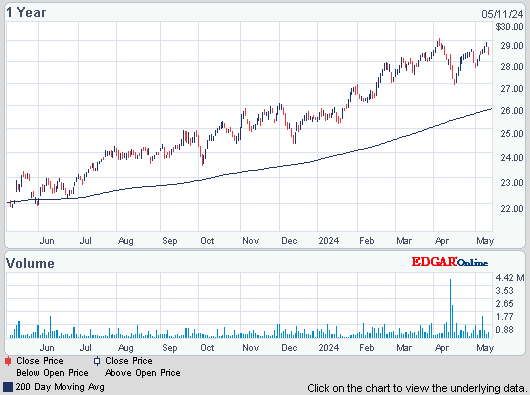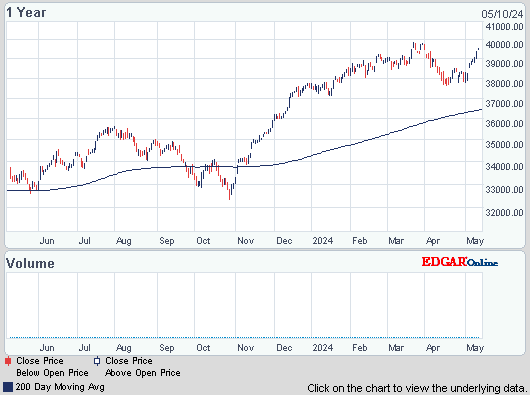Dow recovered 3, decliners over advancers 2-1 & NAZ was off 8. The Financial Index fell 2 to the 244s. The MLP index was down a fraction to the 431s & the REIT index fell 1+ to 281. Both remain near 2013 highs. Junk bond funds rose & Treasuries gained taking the yield on the 10 year Treasury to a 2 week low. Oil fell on
concern Cyprus’s bailout will falter, deepening Europe's debt
crisis. Gold climbed to the highest in 3 weeks as concern that Europe’s debt crisis may intensify
boosted the appeal of the precious metal as a haven.
AMJ (Alerian MLP Index tracking fund)

![Live 24 hours gold chart [Kitco Inc.]](http://www.kitco.com/images/live/gold.gif)


Photo: Bloomberg
Cyprus’s parliament rejected an unprecedented levy on bank deposits, dealing a blow to European plans to force savers to shoulder part of the country’s bailout in a standoff that risks renewed tumult in the euro area. The legislators voted 36 against the proposal with none in favor in a show of hands (but there were 19 abstentions). Hammered out by euro-area finance chiefs at the weekend, the deal had sought to raise €5.8B ($7.5B) by drawing funds from Cyprus bank accounts in return for €10B in intl aid. The € fell to a 3-month low, under $1.29 at the prospect of impasse in Cyprus. Even though the Mediterranean island nation accounts for less than ½ of a percent of the euro zone economy, European officials said that Cyprus must contribute to its own bailout, while stressing that the Cyprus situation is unique.
Cyprus Rejects Deposit Levy in Blow to European Bailout Plan
The EU cleared a major legal hurdle toward establishing a full banking union to stabilize its financial system, just as investor confidence was hit hard by a controversial seizure of a part of all bank deposits in Cyprus. European Parliament lawmakers, the European Commission & national representatives reached an agreement on the laws establishing a centralized banking supervisor that will operate under the aegis of the ECB. "This is a first fundamental step toward a real banking union which must restore confidence in the eurozone's banks and ensure the solidity and reliability of the banking sector," said EU Internal Market Commissioner Michel Barnier. Under the plan, the ECB will be overseeing the bloc's biggest, most interconnected banks, with national watchdogs primarily supervising the rest. The ECB will, however, have the power to intervene in any credit institution in any member if it deems it necessary. The single supervisory mechanism will at first include all 17 eurozone nations, but is open also to the remaining 10 EU nations, which have their own currencies. The joint banking supervisor also paves the way for Europe's bailout fund, the European Stability Mechanism (ESM), to give aid directly to ailing banks, a measure that is vital to help Europe dig out of its 3-year-old debt crisis, caused in part by shaky financial institutions.
EU makes important step toward banking union AP

Photo: Bloomberg
About 200K US homeowners regained positive equity in their properties in Q4 as prices rebounded from a more than 5-year slump, according CoreLogic. At the end of last year, 10.4M homes (21.5%) of all residential properties with a mortgage, were underwater, with owners owing more than the property was worth, down from 10.6M homes (22%) at the end Q3. About 1.7M homeowners returned to positive equity in 2012, the company said. “The scourge of negative equity continues to recede across the country,” Anand Nallathambi, CoreLogic’s CEO said. “The trend toward more homeowners moving back into positive-equity territory should continue in 2013.” The aggregate value of negative equity in the US decreased to $628B from $670B at the end of Q3. The majority of home equity is concentrated at the high end of the housing market. For mortgaged homes valued at more than $200K, 86% are above water, compared with 72% for properties worth less. A 5% gain in prices would return another 1.8M homes (3.7%) out of all residential properties with a mortgage, to positive equity. This improvement is important for a recovery in housing.
U.S. ‘Underwater’ Homeowners Regaining Equity as Prices Increase
The Cyprus bailout is getting a lot of attention but Dow is taking it in stride, falling only 59 this week from its record close on Fri. The implications of a failure by this tiny country can be enormous for Europe & the world economy. When stock markets are at or near record highs, that means priced to perfection, this shows how vulnerable they are. So far Dow is not deeply disturbed. But eventually it will succumb to selling.
Dow Jones Industrials

AMJ (Alerian MLP Index tracking fund)
Treasury yields:
U.S. 3-month |
0.063% | |
U.S. 2-year |
0.236% | |
U.S. 10-year |
1.907% |
| CLK13.NYM | ...Crude Oil May 13 | ...92.71 | ... | (1.5%) |
![Live 24 hours gold chart [Kitco Inc.]](http://www.kitco.com/images/live/gold.gif)


Photo: Bloomberg
Cyprus’s parliament rejected an unprecedented levy on bank deposits, dealing a blow to European plans to force savers to shoulder part of the country’s bailout in a standoff that risks renewed tumult in the euro area. The legislators voted 36 against the proposal with none in favor in a show of hands (but there were 19 abstentions). Hammered out by euro-area finance chiefs at the weekend, the deal had sought to raise €5.8B ($7.5B) by drawing funds from Cyprus bank accounts in return for €10B in intl aid. The € fell to a 3-month low, under $1.29 at the prospect of impasse in Cyprus. Even though the Mediterranean island nation accounts for less than ½ of a percent of the euro zone economy, European officials said that Cyprus must contribute to its own bailout, while stressing that the Cyprus situation is unique.
Cyprus Rejects Deposit Levy in Blow to European Bailout Plan
The EU cleared a major legal hurdle toward establishing a full banking union to stabilize its financial system, just as investor confidence was hit hard by a controversial seizure of a part of all bank deposits in Cyprus. European Parliament lawmakers, the European Commission & national representatives reached an agreement on the laws establishing a centralized banking supervisor that will operate under the aegis of the ECB. "This is a first fundamental step toward a real banking union which must restore confidence in the eurozone's banks and ensure the solidity and reliability of the banking sector," said EU Internal Market Commissioner Michel Barnier. Under the plan, the ECB will be overseeing the bloc's biggest, most interconnected banks, with national watchdogs primarily supervising the rest. The ECB will, however, have the power to intervene in any credit institution in any member if it deems it necessary. The single supervisory mechanism will at first include all 17 eurozone nations, but is open also to the remaining 10 EU nations, which have their own currencies. The joint banking supervisor also paves the way for Europe's bailout fund, the European Stability Mechanism (ESM), to give aid directly to ailing banks, a measure that is vital to help Europe dig out of its 3-year-old debt crisis, caused in part by shaky financial institutions.
EU makes important step toward banking union AP

Photo: Bloomberg
About 200K US homeowners regained positive equity in their properties in Q4 as prices rebounded from a more than 5-year slump, according CoreLogic. At the end of last year, 10.4M homes (21.5%) of all residential properties with a mortgage, were underwater, with owners owing more than the property was worth, down from 10.6M homes (22%) at the end Q3. About 1.7M homeowners returned to positive equity in 2012, the company said. “The scourge of negative equity continues to recede across the country,” Anand Nallathambi, CoreLogic’s CEO said. “The trend toward more homeowners moving back into positive-equity territory should continue in 2013.” The aggregate value of negative equity in the US decreased to $628B from $670B at the end of Q3. The majority of home equity is concentrated at the high end of the housing market. For mortgaged homes valued at more than $200K, 86% are above water, compared with 72% for properties worth less. A 5% gain in prices would return another 1.8M homes (3.7%) out of all residential properties with a mortgage, to positive equity. This improvement is important for a recovery in housing.
U.S. ‘Underwater’ Homeowners Regaining Equity as Prices Increase
The Cyprus bailout is getting a lot of attention but Dow is taking it in stride, falling only 59 this week from its record close on Fri. The implications of a failure by this tiny country can be enormous for Europe & the world economy. When stock markets are at or near record highs, that means priced to perfection, this shows how vulnerable they are. So far Dow is not deeply disturbed. But eventually it will succumb to selling.
Dow Jones Industrials











No comments:
Post a Comment